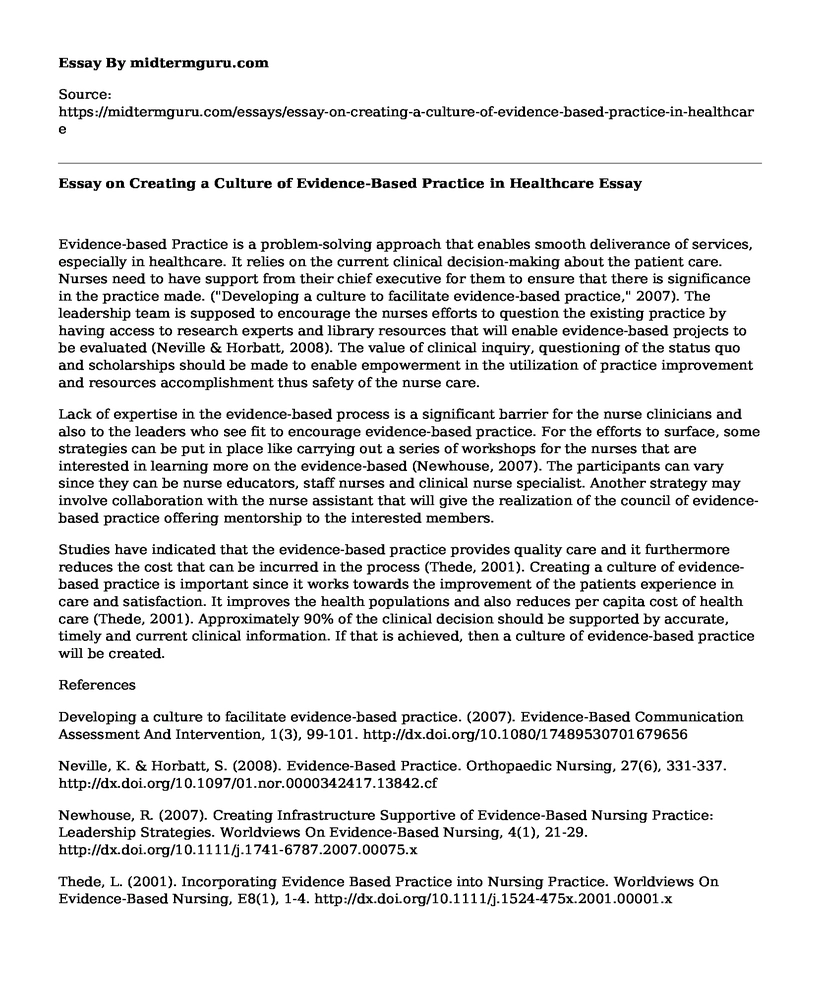Evidence-based Practice is a problem-solving approach that enables smooth deliverance of services, especially in healthcare. It relies on the current clinical decision-making about the patient care. Nurses need to have support from their chief executive for them to ensure that there is significance in the practice made. ("Developing a culture to facilitate evidence-based practice," 2007). The leadership team is supposed to encourage the nurses efforts to question the existing practice by having access to research experts and library resources that will enable evidence-based projects to be evaluated (Neville & Horbatt, 2008). The value of clinical inquiry, questioning of the status quo and scholarships should be made to enable empowerment in the utilization of practice improvement and resources accomplishment thus safety of the nurse care.
Lack of expertise in the evidence-based process is a significant barrier for the nurse clinicians and also to the leaders who see fit to encourage evidence-based practice. For the efforts to surface, some strategies can be put in place like carrying out a series of workshops for the nurses that are interested in learning more on the evidence-based (Newhouse, 2007). The participants can vary since they can be nurse educators, staff nurses and clinical nurse specialist. Another strategy may involve collaboration with the nurse assistant that will give the realization of the council of evidence-based practice offering mentorship to the interested members.
Studies have indicated that the evidence-based practice provides quality care and it furthermore reduces the cost that can be incurred in the process (Thede, 2001). Creating a culture of evidence-based practice is important since it works towards the improvement of the patients experience in care and satisfaction. It improves the health populations and also reduces per capita cost of health care (Thede, 2001). Approximately 90% of the clinical decision should be supported by accurate, timely and current clinical information. If that is achieved, then a culture of evidence-based practice will be created.
References
Developing a culture to facilitate evidence-based practice. (2007). Evidence-Based Communication Assessment And Intervention, 1(3), 99-101. http://dx.doi.org/10.1080/17489530701679656
Neville, K. & Horbatt, S. (2008). Evidence-Based Practice. Orthopaedic Nursing, 27(6), 331-337. http://dx.doi.org/10.1097/01.nor.0000342417.13842.cf
Newhouse, R. (2007). Creating Infrastructure Supportive of Evidence-Based Nursing Practice: Leadership Strategies. Worldviews On Evidence-Based Nursing, 4(1), 21-29. http://dx.doi.org/10.1111/j.1741-6787.2007.00075.x
Thede, L. (2001). Incorporating Evidence Based Practice into Nursing Practice. Worldviews On Evidence-Based Nursing, E8(1), 1-4. http://dx.doi.org/10.1111/j.1524-475x.2001.00001.x
Cite this page
Essay on Creating a Culture of Evidence-Based Practice in Healthcare. (2021, Jun 02). Retrieved from https://midtermguru.com/essays/essay-on-creating-a-culture-of-evidence-based-practice-in-healthcare
If you are the original author of this essay and no longer wish to have it published on the midtermguru.com website, please click below to request its removal:
- Personal Safety at Good Shepherd Hospice - Essay Sample
- Human Needs Theory Interactive Case Study
- Questions and Answers on Human Factors and Errors in Public Health - Paper Example
- Essay Sample on Ethical Issues on the Use of Artificial Organs on Humans
- Essay Sample on Salicylic Acid and Aspirin
- Future of Nursing: Leading Change, Improving Health Care Delivery - Research Paper
- Article Analysis Essay on Discussing Death, Dying, and End-Of-Life Goals of Care







